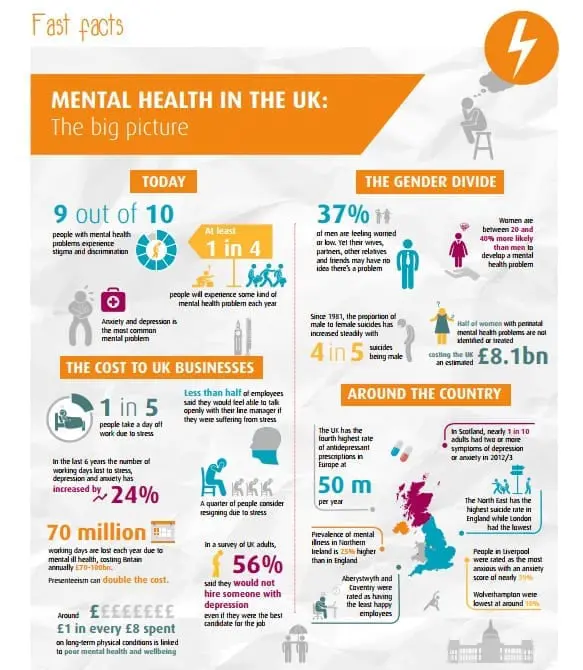
Managing mental health in the workplace
Last year I wrote an article on Why World Mental Day is important to us all. This year’s theme set by the World Federation for Mental Health is mental health in the workplace.

Do you disclose in the workplace?
Despite the great campaigning work by the likes of Heads Together and Time to Change, the issue of mental health in the workplace still remains a big issue. One real concern for most people with a mental health issue is whether or not to disclose this in the workplace.
Mental Health remains a taboo subject, so it only stands to reason that many people won’t disclose the real reason for taking time off work. Insomnia, depression, stress count for so many sick days. If you don’t feel supported, it is difficult to address and ask for help.
More so after Brexit people are worried about losing their jobs through redundancies and restructures. A source of constant stress. If people are unhappy in their current employment, they are not so likely to ‘jump ship’. With so much competition working in the city, the last thing we feel we can do is give people a reason to doubt our ability to do our jobs well.

The Mental Health at Work Report 2017 commissioned by Business in the Community and sponsored by Mercer, and run by YouGov. With 3 of out 5 employees experiencing mental health issues in the past year due to work, it appears that workplace mental health is an ongoing problem.
Findings in the report include:
- Almost a third (31%) of the workforce have been formally diagnosed with a mental health issue.
- 84% of employers acknowledge that they have a responsibility towards their employee’s mental wellbeing
- 91% of managers agree that what they do affects the wellbeing of their staff.
- However, despite this, less than a quarter (24%) of managers have received any training in mental health.
- In 15% of cases where the employee disclosed a mental health issue to a line manager, the employee became subject to disciplinary procedures, dismissal or demotion.
It paints a rather bleak picture for those attempting to manage their mental health in the workplace.

Equality Acts prevents discrimination at work
The Equality Act protects you from being discriminated against at work. If your mental health is classed as a disability you will also need to formally disclose it to your employer. If you think you are being discriminated against. Raise the matter informally to try and resolve any issues. Your employer should have a formal grievance process should you feel that you want to take things further.
Charity Mind is just one of the people you can seek information from if you feel you are being discriminated against.
World Mental Health Day encourages us to talk openly about our mental health. The reality is that it all depends on how you feel you can manage this within your workplace. Some bosses may be incredibly supportive. However, not everyone is so lucky. Look for a confidant at work who can be your go-to person if you are having a bad day. Confide in HR if you feel you need extra support. Understand what rights you have.
Most of all. Make your own well-being and mental health a priority.

5 Tips on how to look after yourself
One of the most important things to do is to take good care of yourself. It’s so easy when your energy is low – you feel depressed, anxious – and not sleeping is to stop taking care of yourself. This is the time when you should prioritise your own well-being.
1. Stop working overtime. Your productivity may suffer. Working longer hours when you are already exhausted is only going to make things worse
2. Reclaim your lunch break. It’s so easy to work through lunch when deadlines are stacking up and you feel behind on everything. Break up the day by reclaiming your lunch break. Make sure you also eat lunch.
3. Connect. It’s easy to isolate yourself and shut yourself off from friends and family. Try and connect with friends. Let them know how you are feeling.
4. Relax and unwind. Clear your bedroom. Get rid of the mobile phone, laptop. Try and find some solitude and rest
5. Ask for help. Establish what needs to be done on a daily and weekly basis. Set clear goals and expectations for yourself. Talk to HR or your direct manager.
| Disclaimer: I am not a trained professional and am only writing from a personal point of view. If ever you are suffering and feel suicidal, seek immediate help. Go to A+E or call your local GP. |
